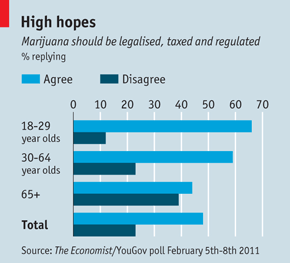Megan McArdle has a piece in the Atlantic: The Goals and Means of Meth Control. It looks at the ravages of drug abuse and also continues the discussion started by Keith Humphreys in his simplistic endorsement of making pseudoephedrine-based products prescription-only and Mark Kleiman’s follow-up.
Megan’s article is a good one to read, in that she gets some things right and opens the door to an important discussion in areas where she makes some important flawed assumptions.
First, the good stuff.
So with meth, we made it illegal, and then it turned out you could make the stuff from cold medicine in a very dangerous and dirty home production process, so we made it hard to get cold medicine, so they switched to an even more dangerous process, so now we’re going to make it even harder to get cold medicine . . .
At every step, we don’t consider the whole cost of functionally prohibiting cold medicine; we consider only the marginal cost of the new prohibition. And we compare that marginal cost to the whole cost of drug addiction, nasty amateur meth labs, etc. This policy ratchet means we can easily end up in a situation where the sum of our drug laws are worse than the disease of drug addiction, even though no one particular prohibition is.
This is an excellent point that is too often ignored. And it’s an important response to the kind of ridiculous emotionally-charged “policy” discussions that Humphreys employs:
If people get less cold relief but fewer children end up in the burn unit, I will vote for that trade.
It isn’t our desire to have cold medicine available when we actually have a cold that leads to children in the burn unit, it is prohibition that leads to children in the burn unit, and the notion that what we need is a distraction from addressing the real problem by adding another ancillary harm to the existing harmful regime — well, that’s just offensive.
Again, when it comes to understanding marginal cost, Megan gets is.
However, in her conclusion, McArdle gets caught up in the same fallacious fears that catch so many people in discussions of prohibition.
Against all this, you have to weigh the fate of people like Julie. Legal drugs undoubtedly mean more addicts. Maybe not a lot more–I don’t think we know how many people would get hooked on blow or crystal meth if it were legal. Personally, I haven’t tried the stuff not because it’s illegal, but because I am fabulously addictive to stimulants, and it seems sensible of me not to try anything that I might like well enough to sacrifice family, friends and career on its altar. I suspect that most people are like me. But it’s hard to say without running a big, scary natural experiment.
Personally, when I throw in the crime these black markets create, and the personal liberty costs of prohibition, I favor legalizing all of them. But I recognize the cost is more lives blighted like Julie’s. My only answer is that this would also be a world where fewer black kids lose their parents–or themselves–to the prison system, and fewer babies are badly burned when Daddy’s meth lab explodes. There are no real happy answers here–only damage control.
First of all, I suspect that Megan’s self-awareness is probably enough to insure that even if she did try the stuff, she wouldn’t end up sacrificing “family, friends and career on its altar.” But she rightly points out one of the reasons why it’s wrong to assume that the natural experiment should be so scary. However, there are plenty more.
There is absolutely no reason to assume, as Megan does (and so many others do), that there is a certainty of “more lives blighted like Julie’s.”
Let’s look at this a step at a time.
First, how will legalization affect use? It does seem likely that legalization of a formerly illicit drug will involve some increase in use. Of course, every bit of data that we have (various decriminalization moments in U.S. states as well as places such as Portugal and the Netherlands) indicates that, if properly managed, such increases are likely to be minimal and/or temporary (including a perfectly logical temporary spike due to curiosity).
And those increases and spikes will also be strongly influenced by the perception of harm and by social approbation. We have dramatically decreased the interest in trying/starting cigarette smoking due to conveying a perception of harm and through social disapprobation.
This means that individual drugs will see temporary spikes/increases in inverse relationship to the perception of harm and social disapproval.
Marijuana is likely to see a much larger increase in use than meth. Despite government efforts, most people don’t see a huge downside to marijuana use as opposed to a very real perception of danger regarding meth use. Also, in most social settings, the notion of breaking out a joint if legalized would be much more acceptable than breaking out a meth pipe.
The idea that legal cocaine would see as much use as alcohol (as is often claimed by Mark Kleiman and others) is patently ridiculous for these reasons. Alcohol has a far greater social acceptance and a much lower perception of harm.
Now the problem is that to this point, all we’ve been talking about is use. Unless you’re a sado-moralist who just wants to punish people for doing things they don’t like, then increases in use are generally irrelevant.
Yes, I said that “increases in use are generally irrelevant.”
If what you are really concerned about are the people like Julie, then all that matters is increased levels of abuse. I’m drinking scotch right now, and am not hurting myself or others, so nobody gives a damn about my use, nor should they.
One place people get it wrong is thinking that an increase in use will result in a corresponding increase in abuse.
Imagine a fictional drug called melange. It’s prohibited, and let’s pick some simple numbers for our calculations. 100,000 people use melange under prohibition. 10,000 of those abuse it. Under legalization, an additional 20,000 will use it.
There are a couple of way-too common mistakes made at this point. One is to assume that 10% of the new 20,000 users will be abusers (I’m not even including the morons who think we need to worry about all 20,000). Another is to assume that there will be no impact on those who are already abusing. Here’s what the incorrect assumptions look like.
| Melange under prohibition |
Totals |
Melange under legalization |
Initial group |
Added group |
Totals |
| Users |
100,000 |
Users |
100,000 |
20,000 |
120,000 |
| Abusers |
10,000 |
Abusers |
10,000 |
2,000 |
12,000 |
Under this simplistic projection with bad assumptions, there are an additional 2,000 people (2,000 Julies, if you will) that we need to worry about. These are the poor souls that Megan McArdle and others are trying to balance with the damages of prohibition.
But that’s wrong.
- There’s no reason to assume that 10% of the additional users will become abusers. There’s not some magical law of nature that dictates a percentage of users to be abusers. No, the fact is that some people are more likely to be predisposed to be abusers of certain kinds of drugs (something that Megan alluded to in her personal concern re: stimulants), and merely increasing the number of casual or curious users does not increase the number of those predisposed.
And prohibition, despite all its oppression, provides no real barrier to obtaining drugs for those who are prone to abuse. For those predisposed, they’ve already either become abusers (of this, or other drugs) or, like Megan, decided not to take that chance. Either way, legalization doesn’t make them start abusing.
Sure, there may be a few additional new abusers, but there really is no strong reason to assume any remarkable increase.
- Legalization will also provide a net positive impact on those who were already abusing during prohibition, through: the increased ease in getting help (due to a change of stigma); the increased safety of dose and purity; the ability to have a more stable life situation without having to constantly find money for your next fix; etc. Some of these factors will actually help abusers quit, while others will reduce the drug harm to existing abusers. The net effect will be the equivalent of a significant reduction in abusers.
These two factors are huge and argue strongly against concerns for some mythical large group of new Julies under legalization.
Let’s try a very conservative set of numbers with our fictional drug given these corrected assumptions. Say that there’s fewer, but still a significant increase in abusers under legalization (1,000 new abusers) as well as a reduction of abusers/drug harm equivalent of 10% of the current abusers.
Now check out our chart:
| Melange under prohibition |
Totals |
Melange under legalization |
Initial group |
Added group |
Totals |
| Users |
100,000 |
Users |
100,000 |
20,000 |
120,000 |
| Abusers |
10,000 |
Abusers |
9,000 |
1,000 |
10,000 |
No net increase in total number of abusers. No increase in drug harm. Yes, this is just one potential outcome, and there’s no way of knowing exactly how it would turn out given all the variables. It’s possible, though unlikely, that we could end up with some small increase in abusers. But the argument can just as easily (if not more easily) be made, given the points mentioned above, that there would actually be a net decrease in drug harm.
Either way, factor in the documented and pervasive destruction caused by prohibition and there’s no question that legalization is the preferred approach.
There’s no scary experiment involved here. It’s a big experiment, sure, but the only scary thing is not doing it.
 At some point, they realize that they’ve used everything that they have in their arsenal with no positive result and that the destruction of earth is inevitable.
At some point, they realize that they’ve used everything that they have in their arsenal with no positive result and that the destruction of earth is inevitable.

